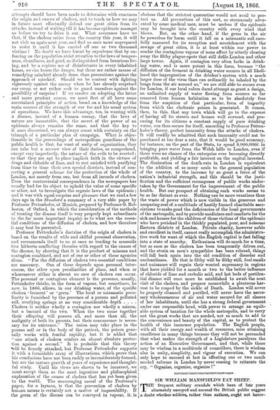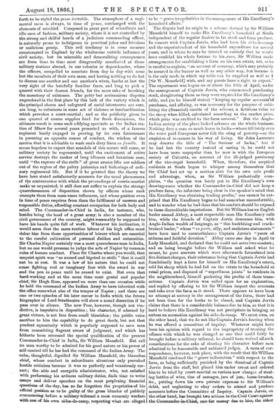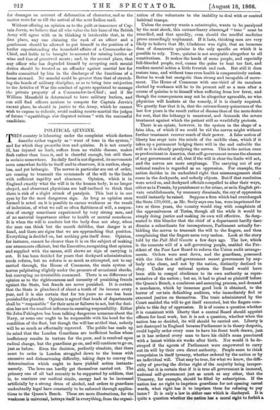SIR WIT-WM MANSFIELD'S `FAT SHEEP.
HE frequent military scandals which have of. late years ' ' alternately annoyed and amused the British public suggest 'a doubt whether soldier*, rather, than anthora, ought not hence-
forth to be styled the genus irritabile. The atmosphere of a regi- mental mess is always, in time of peace, surcharged with the elements of mischief. Composed in great part of schoolboys and idle men of fashion, military society, where it is not controlled by the strong and skilful hands of a judicious commanding officer, isnaturally prone to indulgence in practical jokes and frivolous or malicious gossip. This evil tendency is in some measure counteracted in England by the wholesome outside influence of civil society, but its miserable and demoralizing consequences are from time to time most disagreeably manifested at those military stations abroad, in our colonies or dependencies, where the- officers, compelled to associate from day to day with none but the members of their own mess; and having nothing to do but to dismiss one another and one another's wives, loathe at last the very sight of the hatefully familiar faces, and long to pick a quarrel with their dearest friends, for the mere sake of breaking the monotony of existence. The petty but acrimonious disputes engendered in the first place by this lack of the variety which is the principal charm and safeguard of social intercourse are sure, ere long, to culminate in some act of violence or insubordination which provokes a court-martial ; and as the publicity given to one quarrel of course supplies food for fresh dissensions, the ultimate result is some such edifying spectacle as the Indian sta- tion of Mhow for several years presented us with, of a famous regiment busily engaged in proving, by its own fatuousness in pursuing an opposite course of conduct, the wisdom of the maxim that it is advisable to wash one's dirty linen en .famille. It seems hopeless to expect that scandals of this nature will cease, or military society be regenerated, until the excitement of active service destroys the canker of long idleness and luxurious ease, until "the rapture of the strife" of great armies lifts our soldiers -out of the region of the paltry jealousies and bickerings of ordi- nary regimental life. Bat if it be granted that the theory we have here stated satisfactorily accounts for' the usual phenomena -of the controversies with which the proceedings of courts-martial make us acquainted, it still does not suffice to explain the strange -quarrelsomeness of disposition shown by officers whose rank -exempts them from mess-room influences, and whose position even in time of peace requires from them the fulfilment of onerous and responsible duties, affording constant occupation for both- body and -mind. The Commander-in-Chief in India, for instance, who, besides being the head of a great armyr is also a member of the civil government of the -country, might- reasonably be supposed to have his hands quite full of work: Whatever his inclination, it -would seem that the mere routine- labour of his high office must :debar him from those opportunities of leisure which are essential to the careful cultivation of • personal dislikes and animosities. Sir Charles Napier certainly was a most quarrelsomeman in India, but no one would presume to judge:the acts of Napier by common rules of human conduct. Place- Sir Charles where you would, that unquiet spirit was "so nursed and bigoted to strife " that it could net be at rest. It was- a law of his nature that he could not 'cease fighting real or- imaginary foes with the sword in war and the pen in peace until he ceased to exist. But even that hard-working and at the same time • most genial and- popular -chief,' Sir Hugh Rose, appeared -on more than one occasion while he held the command of the Indian Army to have inherited with 'the office somewhat also of the temper of Napier ; and there are -one- or two episodes of his later -career in India which the future biographer of Lord Strathnaira will show a sound discretion if he pass over • in silence. The new- Peer, however, though not vin- dictive, is impulsive in disposition ; his character, if adorned by great virtues, is not free from small blemishes ; the public voice -ascribes to him the capability- to do great deeds, but not that prudent equanimity which- is popularly supposed to save men from committing flagrant errors of judgment, and which has -hitherto been esteemed the special qualification of the present 'Commander-in-Chief in India, Sir William Mansfield. But call no man worthy to be admired for his good nature or his power of ' self-control till he has had the command of the. Indian Army. The calm, thoughtful, dignified Sir William Mansfield, the blameless: chief, whose conduct in subordinate situations only provoked hostile criticism because it was so perfectly and vexatiously cor- rect; the: able and energetic administrator, who, not• satisfied with performing, his arduous military duties, finds time to write -essays and deliver, speeches, on the most perplexing financial, questions, -of the day, has so; far forgotten the proprieties-of his official position as to be guilty:of the gross blunder- of publicly
ommencing before a military:tribunal a most unseemly welfare with one- of his own aides-de-camp, respecting what are alleged to be " grave irregularities in the management of His Excellency's household affairs."
The dispute had its origin in a scheme devised by Sir William Mansfield himself to make His Excellency's household at Simla independent of the regular dealers in fat stock and farm produce. In concert with Captain Jervis, who had been his aide-de-camp and the superintendent of his household expenditure for several years, and in whom he says he trusted so entirely that he would have confided his whole fortune to his.care, Sir William made arrangements for establishing a farm on his own estate, not, as he is careful to explain, " on account of economy, which may probably be secured in the bazaar as well as any other way, but because it is the only mode in which my table can be supplied as well as I [Sir W. Mansfield] wish, and my guests have a right to expect." The experiment was begun on or about the 10th of April, under the management of Captain Jervis, who commenced purchasing stook, slaughtering them as they were required for His Excellency's table, and (as he himself states) " keeping up regular accounteof purchases, and affixing, as was necessary for the purpose of- exhi- biting the (financial) results of the scheme, a fictitious value to the sheep when killed, calculated according to the market price, which price was credited to the farm account." But the Auglo- Indian society of the place looked askance on the whole business. Nothing does a man so much harm in India—where till lately even the worst paid Europeans never felt the sting of poverty—as the suspicion of meanness in his way of living. Sir John Lawrence may deserve the title of " The Saviour of India," but if he had lost the country instead of saving it, he could not have been more unpopular than he now is with the European society of Calcutta, on account of the ill-judged parsimony of the vice-regal household. When, therefore, the sceptical residents at Simla began to whisper among themselves that the . Chief had set up a mutton club for his own sole profit and advantage, when, as Sir William pathetically com- plains, " the question was lately put in His Excellency's own drawing-room whether the Commander-in-Chief did not keep a produce farm, the inference being clear in the speaker's mind that His Excellency was obtaining trading profits," one cannot be sur- prised that His Excellency began to feel somewhat uncomfortable, and to wonder what he had done that his conduct should be exposed to these discreditable imputations. But Sir William has an English butler named Abbey, a most respectable man His Excellency calla him, while the friends of Captain Jervis denounce him, with Anglo-Indian wealth of language, as " this backbiting and crack- brained butler," whose "exparte, silly, and-malicious statements" have been used to counterbalance Captain Jervis's " years of arduous and faithful devotion." Abbey came one day in April to Lady Mansfield, and declared that he could not serve two modems ; and on being brought before Sir William and asked what he meant, he gave answers which were afterwards formulated into five distinct charges, their substance being that Captain Jervis had fraudulently kept a farm for himself on His Excellency's estate, sold fat sheep which he had fed on the estate to the household at retail prices, and disposed of " superfluous joints" to residents in the neighbourhood, bimeelf pocketing the profits of .these trans- actions. Captain. Jervis, was called upon for an explanation, and replied by offering to let Sir William inspect the accounts audtake over the farm as it stood. There appears to have been no attempt at secrecy in the management of the farm, there had not been time for the books. to be closed, and Captain Jervis claims that there is a. considerable balance due to him, so that it is hard to believe His Excellency was not precipitate in bringing, so serious an accusation against his aide-de-camp. We must own, on the other hand, that we do not like Captain.Jervis's fencing when he was offered a committee of inquiry. Whatever might have been his opinion with regard to the impropriety of treating the offence with which he was charged as one that could fairly be brought before a military tribunal, he should have waived all such considerations for the sake of clearing his character before men admitted to be honourable and unbiassed judges, Amass of cor- respondence, however, took place, with the result that Sir William Mansfield condoned the "grave indiscretion" with respect to the farm, as being sufficiently punished by the dismissal of Captain Jervis from the staff, but placed him under arrest and ordered him to be tried by court-martial on•varioas new 'charges -of steal- ing bottles of wine, tins of sausages, jars of jam, horse-brushes, &c., putting down his own, private expenses--to • Sir William's debit, and neglecting to obey orders to attend and • produce accounts: efore the Committee- of Inquiry, Captain Jervie,, on the- otherhand, haw brought two actiolut, in the Civil Court ageing the:Commander-ineChiek 0110411 money dim- to laimi the of
for damages on account of defamation of character, and so the matter rests for us till the arrival of the next Indian mail.
Without offering an opinion as to the guilt or innocence of Cap- tain Jervis, we believe that all who value the fair fame of the British Army will agree with us in thinking it intolerable that, in the first place, any one claiming the rank of an officer and a gentleman should be allowed to put himself in the position of a butler superintending the household affairs of a Commander-in- Chief, and liable to be brought to account for missing bottles of wine and tins of preserved meats ; and, in the second place, that any officer who has degraded himself by accepting such menial duties should be treated as an offender against martial law for faults committed by him in the discharge of the functions of a house steward. No scandal could be greater than that of stretch- ing the bonds of military discipline, so as to bring into subjection to the Articles of War the conduct of agents appointed to manage the private property of a Commander-in-Chief ; and if Sir William Mansfield is determined to have military butlers, and can still find officers anxious to compete for Captain Jervis's vacant place, he should in justice to the Army, which he cannot wish to expose to ridicule, avoid making courts-martial the judges of future " squabblings o'er disputed rations" with the successful candidate.
































 Previous page
Previous page